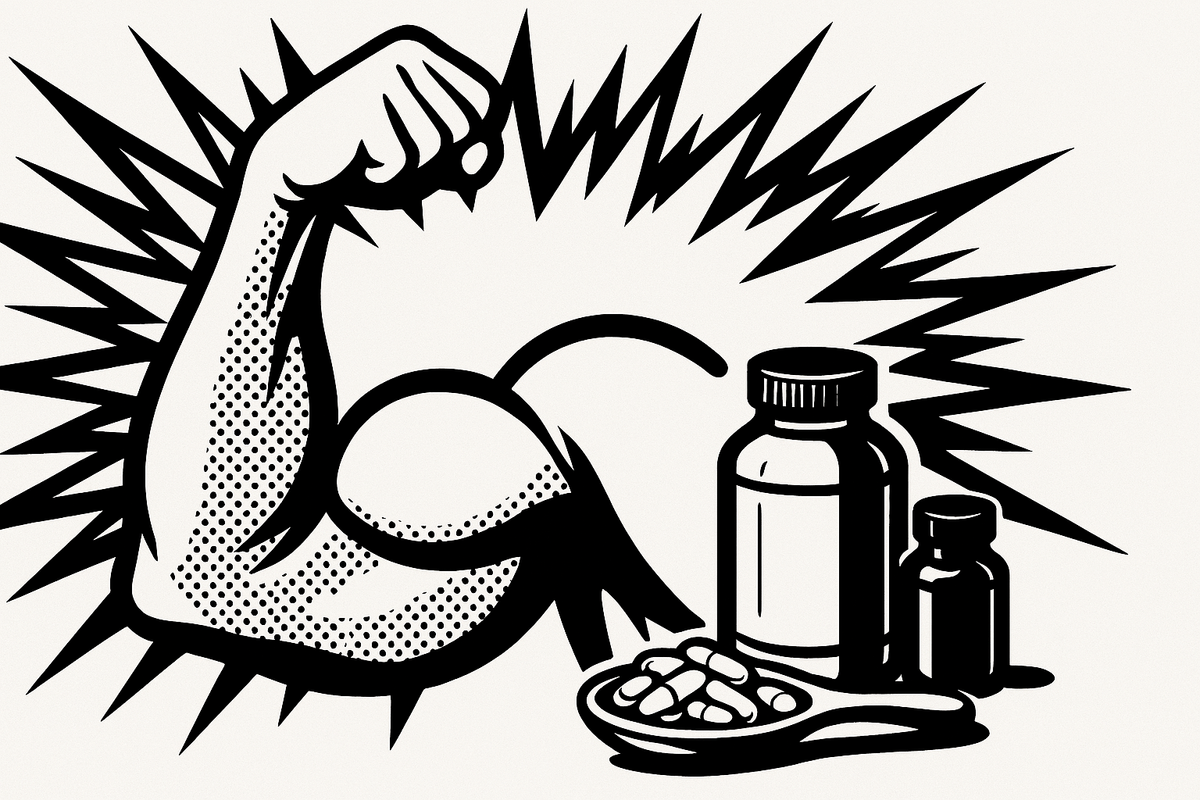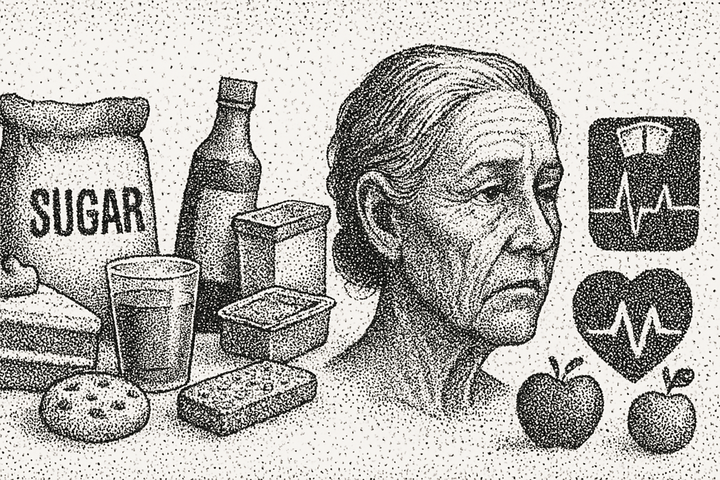Swole Solutions: Creatine, Nitrates, and Supplement Superstars

Building muscle isn't just about eating more protein; other nutrients and compounds play crucial roles in enhancing your workouts and recovery. This guide explores foods and supplements that promote muscle growth through means other than protein, offering a broader approach to your fitness journey.
Enhancing Workout Performance
Certain compounds can boost your exercise intensity, leading to better muscle gains. For example, creatine, found in beef and fish, enhances energy production during high-intensity workouts, potentially increasing muscle mass (Healthline: The Best Supplements for Muscle Growth). Beta-alanine, present in meats like chicken, increases endurance by buffering muscle acidity, allowing for longer, more effective training sessions (Health.com: Boost Your Gym Gains). Nitrates, abundant in beets and spinach, improve blood flow and oxygen delivery, reducing the oxygen cost of exercise and enhancing performance (Bodybuilding.com: 8 Proven Bodybuilding Supplements). Caffeine, from coffee or tea, can also improve endurance and strength, making workouts more productive (Cleveland Clinic: Creatine).
Supporting Recovery and Hormonal Balance
Recovery is key to muscle growth, and nutrients like omega-3 fatty acids, found in fatty fish and flaxseeds, have anti-inflammatory properties that aid post-workout recovery, supporting faster readiness for subsequent sessions (Medical News Today: 30 Muscle Building Foods). Zinc, found in oysters and nuts, is essential for testosterone production, which supports muscle growth, while vitamin D, from salmon and fortified dairy, helps with calcium absorption and muscle function, particularly beneficial if deficient (Holland & Barrett: Supplements for Building Muscle).
Key Compounds and Their Mechanisms
The following table summarizes the primary compounds, their functions, and sources, categorized by their role in muscle growth:
Detailed Analysis by Category
- Enhancing Workout Performance:
- Creatine: Research, such as a 2022 scoping review from MDPI's Nutrients (Creatine Supplementation for Muscle Growth: A Scoping Review of Randomized Clinical Trials from 2012 to 2021), highlights creatine's role in ATP production, crucial for high-intensity exercises. Found in beef and fish, it allows for more intense workouts, potentially leading to greater muscle gains.
- Beta-Alanine: A 2018 study in the Journal of the International Society of Sports Nutrition (Effects of β-alanine supplementation during a 5-week strength training program: a randomized, controlled study) notes its role in increasing carnosine, enhancing endurance during intense exercise. Present in meats, it supports longer training sessions, indirectly promoting muscle growth.
- Nitrates: A 2019 study in Frontiers in Physiology (Dietary Nitrate Supplementation Improves Exercise Tolerance by Reducing Muscle Fatigue and Perceptual Responses) cites studies showing nitrates from beets and spinach improve blood flow, reducing exercise oxygen cost. This enhances performance, particularly in resistance-trained individuals.
- Caffeine: A 2024 meta-analysis in MDPI's Nutrients (Effects of Caffeine Intake on Muscle Strength and Power: A Systematic Review and Meta-Analysis) confirms caffeine's ability to improve endurance and strength, making workouts more productive, found in coffee, tea, and chocolate.
- Supporting Recovery and Hormonal Balance:
- Omega-3 Fatty Acids: A 2019 study in Frontiers in Nutrition (The Influence of Omega-3 Fatty Acids on Skeletal Muscle Protein Turnover in Health, Disuse, and Disease) emphasizes their anti-inflammatory effects, aiding recovery post-workout. Found in fatty fish and flaxseeds, they reduce downtime, supporting frequent training.
- Zinc: A 2020 study in Nutrition Research Reviews (Zinc at the crossroads of exercise and proteostasis) highlights zinc's role in testosterone production, crucial for muscle growth, found in oysters and nuts. Deficiencies can impair muscle function.
- Vitamin D: A 2021 study in Frontiers in Physiology (Vitamin D Promotes Skeletal Muscle Regeneration and Mitochondrial Health) links vitamin D to muscle strength, particularly in older adults, supporting calcium absorption, found in salmon and fortified dairy.
- Specific Amino Acid Supplements and Nuances:
- While amino acids are protein components, supplements like branched-chain amino acids (BCAAs), found in meat and dairy, can stimulate muscle protein synthesis when combined with a balanced diet, as per a 2021 study in Nutrients (Does Branched-Chain Amino Acids (BCAAs) Supplementation Attenuate Muscle Damage Markers and Soreness after Resistance Exercise in Trained Males?). This is particularly useful post-workout, though their role is debated, as a 2017 study in Journal of the International Society of Sports Nutrition (Branched-chain amino acids and muscle protein synthesis in humans: myth or reality?) suggests they may not be as effective as complete protein sources.
Additional Considerations
- Carbohydrates and Healthy Fats: While not directly promoting muscle growth, carbohydrates from whole grains and fruits provide energy for workouts, and healthy fats from avocados support hormone production, both indirectly aiding muscle development. These are broad categories, less specific than the compounds listed, but integral to overall fitness.
- Controversies and Gaps: Some compounds, like phosphatidic acid and HMB, have mixed evidence, particularly for general populations versus specific groups like older adults or those with muscle-wasting conditions. BCAAs also face debate over their necessity if protein intake is adequate, highlighting the need for personalized nutrition plans.
Practical Recommendations
Incorporate these foods into your diet: add beets to salads for nitrates, snack on nuts for zinc, and include fatty fish for omega-3s. For supplements, consider creatine monohydrate for performance and vitamin D3 if deficient, always consulting a healthcare professional to ensure safety and appropriateness.
Conclusion
This detailed exploration underscores that muscle growth extends beyond protein, with various compounds enhancing performance, recovery, and hormonal balance. By integrating these foods and supplements, you can optimize your fitness routine, acknowledging the complexity and individual variability in nutritional needs.
Key Citations
- Creatine Supplementation for Muscle Growth: A Scoping Review of Randomized Clinical Trials from 2012 to 2021
- Effects of β-alanine supplementation during a 5-week strength training program: a randomized, controlled study
- Dietary Nitrate Supplementation Improves Exercise Tolerance by Reducing Muscle Fatigue and Perceptual Responses
- Effects of Caffeine Intake on Muscle Strength and Power: A Systematic Review and Meta-Analysis
- The Influence of Omega-3 Fatty Acids on Skeletal Muscle Protein Turnover in Health, Disuse, and Disease
- Zinc at the crossroads of exercise and proteostasis
- Vitamin D Promotes Skeletal Muscle Regeneration and Mitochondrial Health
- Does Branched-Chain Amino Acids (BCAAs) Supplementation Attenuate Muscle Damage Markers and Soreness after Resistance Exercise in Trained Males?
- Branched-chain amino acids and muscle protein synthesis in humans: myth or reality?
- Healthline: The Best Supplements for Muscle Growth
- Men's Health: The Best Supplements for Muscle Growth
- Health.com: Boost Your Gym Gains
- Medical News Today: 30 Muscle Building Foods
- Cleveland Clinic: Creatine
- Holland & Barrett: Supplements for Building Muscle
- Bodybuilding.com: 8 Proven Bodybuilding Supplements




Comments ()